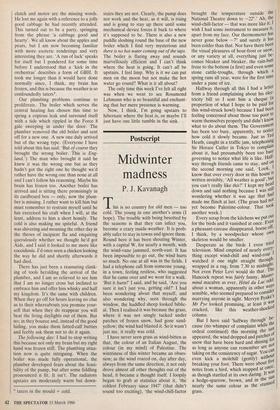Postscript
Midwinter madness
P. J. Kavanagh
This is no country for old men — too cold. The young in one another's arms (I hope). The trouble with being besotted by the seasons is that they can infect you, become a crazy inside-weather. It is prob- ably safer to stay in towns and ignore them. Round here it has been shouting Winter, with a capital W, for nearly a month, with the wind-vane jammed, north-east. It has been impossible to go out, the wind hurts so much. No one at all was in the fields. I had a telephone call from someone young, in a town, feeling restless, who suggested that he came over and we went for a walk. 'But it hurts!' I said, and he said, 'Are you sure it isn't just you, getting old?' I had been wondering about that myself, and also wondering why, seen through the window, the huddled sheep looked biblic- al. Then I realised it was because the grass, where it was not snugly tucked under patches of frozen snow, had gone sand- yellow; the wind had blasted it. So it wasn't just me, it really was cold.
I have never seen grass as wind-bitten as that, the colour of an Italian August, the colour (in my mind) of Palestine. The wintriness of this winter became an obses- sion; as the wind roared on, day after day, always from the same direction, it not only drove almost all other thoughts out of the head, it became a thought itself. I loopily began to grab at statistics about it, 'the coldest February since 1947' (that didn't sound too exciting), 'the wind-chill-factor brought the temperature outside the National Theatre down to —220. Ah, the wind-chill-factor — that was more like it: I wish I had some instrument to measure it, apart from my face. Our thermometer has never gone below —7° and surely it has been colder than that. Nor have there been the visual pleasures of hoar-frost or snow, or any variety at all, everything just be- comes bleaker and bleaker, the rain-butt froze to the bottom (a first) and even some stone cattle-troughs, through which a spring runs all year, were for the first time under a pane of ice. Halfway through all this I had a letter from a friend complaining about his elec- tricity bill so I sent him a cheque (a proportion of what I hope to be paid for this wind-struck howl) because I had been feeling concerned about those too poor to warm themselves properly and didn't know what to do about them. The Government has been too busy, apparently, to notice how cold it slowly became. Just as Ted Heath, caught in a traffic jam, telephoning Sir Horace Cutler in Tokyo to complain about it, had presumably been too busY governing to notice what life is like. Half- way through friends came to stay, and on the second morning one said, 'Look, .1 know that over every door in this house is written invisibly, 'All weather is good', but you can't really like this?' I kept my hea.0 down and said nothing because I was still wondering whether it was age that had made me flinch at last. (The grass had Mit yet become Palestine-colour. That took another week.) Every scrap from the kitchens we put out for the birds and it vanished at once. Even a pheasant-carcase disappeared, borne off, I think, by a woodpecker whose own skeleton would be smaller. Desperate as the birds I even tried television. Mind emptied of nearly even': thing except wind-chill and wind-roar watched it one night straight through, wrapped in a rug, from 7.30 to midnight' Not even Peter Levi would do that. The Hancock repeat was fairly funny, Master: mind macabre as ever, Hotel du Lac odd' about a woman, apparently in other waYs sensible, who seemed prepared to cons1de? marrying anyone in sight. Mervyn Peake s Mr Pye looked promising, at least it Was, cracked, like this weather-shockeo column. But I have said 'halfway through' be- cause (no whimper of complaint while the ordeal continued) this morning the Sting appeared, the wind dropped and patches ni snow that have been hard and shining fc)r, as long as anyone can remember are no taking on the consistency of sugar. YOU eatit even kick a molehill (gently) 'with°. `le breaking your foot. There were about fiv notes from a bird, which stopped at one% as though startled at its own daring. It wan a hedge-sparrow, brown, and in the sa A nearly the same colour as the stunne'" grass.


















































 Previous page
Previous page